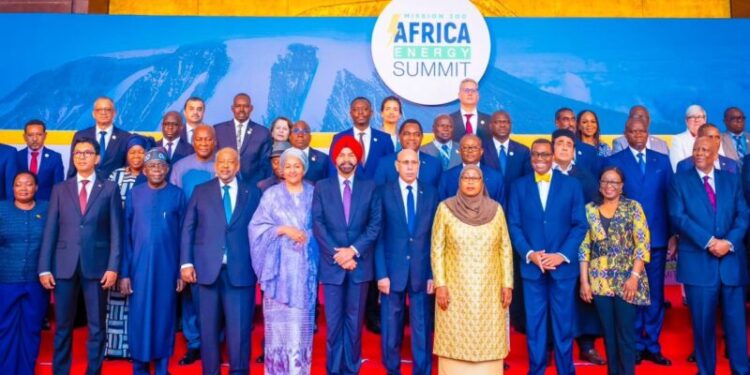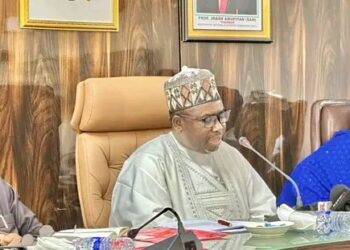President Bola Tinubu has concluded his visit to Dar es Salaam, Tanzania, where he joined other African leaders to participate in the Mission 300 Africa Energy Summit.
The President, who arrived with his team arrived on Sunday, is now on his way back to Abuja.
The two-day summit, hosted by the government of Tanzania in collaboration with the African Union, the African Development Bank (AfDB), and the World Bank Group, adopted the Dar es Salaam Declaration.
The Declaration focused on providing access to electricity for 300 million people in Africa by 2030.
The high point of the event was the presidential endorsement of the Dar es Salaam Declaration by African leaders at the Julius Nyerere International Convention Centre.
Following the reading of the Declaration, leaders from Nigeria, Chad, Côte d’Ivoire, the Democratic Republic of the Congo, Liberia, Madagascar, Malawi, Mauritania, Niger, Senegal, Tanzania, and Zambia signed the document.
Through the Declaration, the leaders from the 12 countries expressed their commitment to ensuring electricity access for their citizens in the next five years.
The 12 nations plan to achieve the goal through National Energy Compacts, which identify specific policy measures to address constraints across their energy sector and set targets based on their unique context.
In the speech read by Mr Adebayo Adelabu, the Minister of Power, the Nigerian leader lauded the AfDB, the World Bank Group and development partners for their collective pledge to bring electricity access to 300 million people in Africa by 2030.
President Tinubu called on African leaders to prioritise energy access, emphasising collective action.
“Let us work together to create a brighter future for our citizens—where every African can access reliable and affordable energy.
“A future where our industries thrive, our economies grow, and our people prosper,” the President said.
President Tinubu also used the occasion to reaffirm Nigeria’s commitment to providing reliable, affordable, and sustainable electricity to its unelectrified population by 2030.
“This is an ambitious goal, but we can achieve it together.
“As Nigeria’s President, I am committed to making energy access a top priority,” he said.
Detailing the substantial progress Nigeria has achieved with the support of international development partners, President Tinubu acknowledged AfDB’s $1.1 billion, expected to provide electricity for five million people by the end of 2026.
He said the bank’s $200 million in the Nigeria Electrification Project would provide electricity for 500,000 people by the end of 2025.
“We also look forward to the AfDB’s planned $700 million investment in the Nigeria Desert to Power programme and its planned $500 million facility for the Nigeria-Grid Battery Energy Storage System, which will provide electricity for an additional two million people.
“We have equally begun making plans to ensure the effectiveness of the World Bank’s $750 million support for expanding Nigeria’s distributed energy access via mini-grids and standalone solar systems that will provide access to power to 16.2 million people,” he said.
President Tinubu thanked Mr Ajay Banga, President of the World Bank Group, and Dr Akinwunmi Adesina of AfDB for their transformative vision, which he said “will light up and power Africa.”
He also applauded the contributions of the UN Sustainable Energy For All, the Rockefeller Foundation, and the Global Energy Alliance for Development.
“As we all know, Africa is rich in energy resources, yet millions of our citizens still lack access to reliable and affordable energy.
“This situation is unacceptable. It is our responsibility to take collective action to change this narrative,” President Tinubu said.
President Tinubu highlighted ongoing investments in renewable energy, particularly solar power in Nigeria.
“For example, the Federal Government is in the final stages of developing an electric vehicle (EV) charging infrastructure programme emphasising renewable energy and establishing stricter vehicle emission standards.
“This will ease adoption barriers, galvanise partnerships, and provide affordable EV financing options. I am pleased to announce that the first 100 electric buses are already in the country.
“Nigeria’s energy sector is growing as a direct result of our reforms. The Nigerian government continues incentivising those interested in investing in renewable energy, oil and gas energy efficiency,” he said.
He said that buoyed by Nigeria’s successful attraction of over six billion dollars in new investments into its energy sector in 2024 alone, his administration is keen to build on this success in 2025 and beyond.
At the summit, the International Finance Corporation announced that it had committed $70 million in private sector funding to five Nigerian Renewable Electricity Service Companies.
This is under the Nigeria Distributed Access Through Renewable Energy Scale-Up programme, to be implemented by the Rural Electrification Agency.
Nigeria’s National Energy Compact, presented at the summit on Monday, sets targets with implementation timelines and outlines for the various planned reforms.
They include expanding power generation and investing in transmission and distribution infrastructure at competitive costs.
The reforms are geared towards financially viable utilities that provide reliable service, and incentivising private sector participation to unlock additional resources.
Other reforms include embracing distributed renewable energy and clean cooking solutions for affordable last-mile access and leveraging the benefits of increased regional integration.
According to the document, Nigeria will require an investment of $23.2 billion for last-mile electrification, including contributions from the public and private sectors. (NAN)











